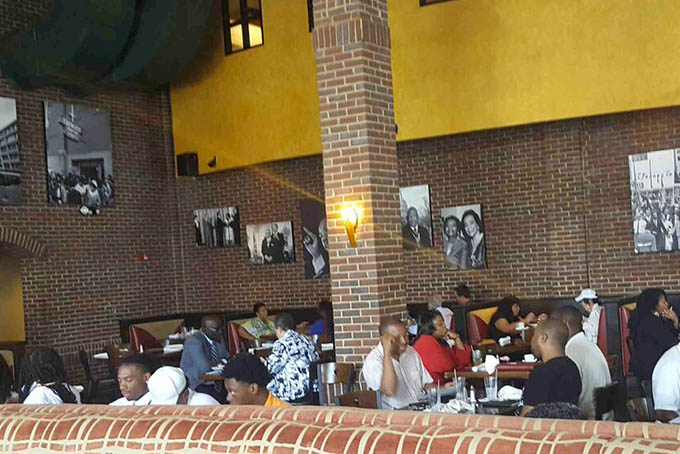
Paschal’s has been Atlanta’s premier soul food restaurant for nearly 70 years. It’s secret recipe? A rare blend of down-home cooking, civil rights and community activism.
The sole focus was soul food, at first.
Owners James and Robert Paschal opened a small sandwich shop in 1947. Because it lacked a stove, the brothers cooked food at Robert’s house and brought it to Paschal’s. It blossomed into a viable community asset a decade later, when it expanded into a 30-seat space and became a local destination for national leaders.
Martin Luther King Jr., Ralph Abernathy, Andrew Young, John Lewis and other civil rights activists were attracted to Paschal’s fried chicken, rice and gravy and collard greens. In turn, the Paschals were committed to the civil rights movement. Those elements transformed that small venue into a movement hub, where strategy was hatched to fight, march and protest for African-American’s rights in the 1960s.
“Paschal’s is an institution,” said Congressman John Lewis (D – Georgia). “Period. We got a lot of stuff done there.”
James Paschal and the late Atlanta builder Herman Russell constructed a glossy new Paschal’s in 2002, less than a mile from the original. The spacious, loft-like structure features high ceilings, exposed brick walls, wrought iron and African cloth motif. It is nothing like its non-descript predecessor on the ground floor of Paschal’s Motor Hotel. But today’s Paschal’s thrives, thanks to consistently tasty food and a history that resonates with diners.
“That’s the beautiful part about this place,” said general manager Kim Ransom. “It’s still important to people who know the history and the community. It’s sort of a monument in that it was the place so much of the civil rights movement was figured out. And today the movers and shakers of the city still, after all the decades, find Paschal’s as the place to get a good meal and discuss serious business.
“A television station wanted to interview John Lewis recently. He said, ‘Sure. But it has to be done at Paschal’s.’ It’s that important and makes this a different kind of restaurant from other places.”
Indeed, Paschal’s longevity and community connection inspire one young prospective restaurateur.
“As a bartender who wants to one day own a restaurant, I look at Paschal’s and what it has done — it’s been more than an eating place — and see that’s the way to go,” said Xavier Martin, 34, who moved from Chicago to Atlanta in 2011. “Restaurants come and go. But this place has been in existence since the ‘40s. My parents weren’t even born then…But the formula works, apparently. Mean something to your community besides the food.”
But the food cannot be ignored. Fried chicken remains its bestseller; the recipe is a long-held secret. Otherwise, the menu is Soul Food 101: baked chicken, macaroni and cheese, yams, collards, cornbread, peach cobbler. Also, sandwiches, fish, pasta, and even gumbo and other Cajun delights. Diners include businessmen and politicians in suits and ties discussing deals, workers on lunch breaks, students between college classes, retired city workers and tourists.
Paschal’s also serves a heaping side dish of history. The Paschal brothers provided food and space for King and other civil rights leaders and contributed bail money when protesters were arrested. A huge drawing of King dominates a back wall. Other poignant images include the original Paschal’s, Coretta Scott King, Ebenezer Baptist Church, activists marching, and Joseph Lowery receiving a Medal of Honor from President Obama.
Paschal’s was nicknamed “Little City Hall” after Maynard Jackson, another frequent visitor, became Atlanta’s first black mayor. Today, the Paschal’s legacy fills one corner of the restaurant, where newspaper articles and photos tell this institution’s vast story.
“I heard of this place, but I didn’t know the history was so strong,” said Thelma Mitchell, 52, from Memphis. “I brought my grandson because he loves to eat, and I heard the food was good, which it is. But we looked around and learned a lot…To think that Dr. King is a part of Paschal’s history is something else.”
While the modern Paschal’s lacks the original’s 1960s cachet, it still draws dignitaries including Mayor Kasim Reed and other dignitaries who talk business over plates of authentic soul food
James Paschal died at 88 in 2008, and Herman Russell passed away last year.
“After Mr. Russell died, people were kind of panicked,” said Ransom, who has streamlined some of Paschal’s operations. “They asked, ‘What’s going to happen to the restaurant?’ The answer is easy. Nothing. Mr. Russell’s family remains committed to Paschal’s, and it will always thrive. And you know what? The city wouldn’t let it close. It means that much to Atlanta.”
-30-